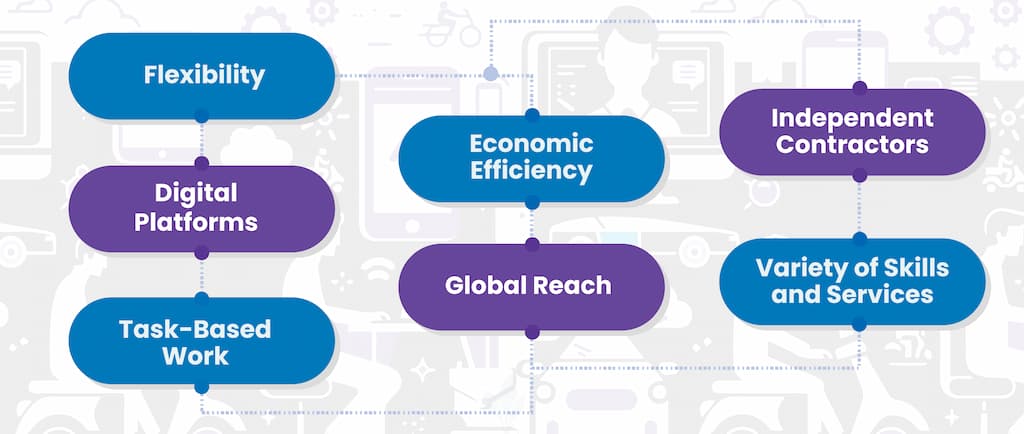The gig economy, also known as the freelance or on-demand economy, refers to a labor market characterized by the prevalence of short-term, flexible jobs, often facilitated by digital platforms.
In a gig economy, individuals work on a temporary or freelance basis, taking on specific tasks or projects for various employers rather than being employed in traditional, full-time roles.
Key features of the gig economy include:

Flexibility
Workers in the gig economy have the flexibility to choose when, where, and how much they work. This flexibility is appealing to individuals seeking a better work-life balance or those who have other commitments, such as students, parents, or individuals with multiple jobs.
Digital Platforms
The gig economy is heavily reliant on digital platforms and online marketplaces that connect freelancers with clients or companies seeking specific services. Examples of these platforms include Uber, Lyft, Upwork, Fiverr, and TaskRabbit.
Task-Based Work
Jobs in the gig economy are often task-oriented, with workers taking on specific projects or assignments. This can range from driving passengers to designing a logo, writing content, or providing virtual assistance.
Independent Contractors
Workers in the gig economy are typically classified as independent contractors or freelancers rather than traditional employees. This means they are responsible for their own taxes, insurance, and other benefits.
Variety of Skills and Services
The gig economy encompasses a wide range of skills and services, including but not limited to transportation, writing, graphic design, software development, marketing, and administrative support. Virtually any skill that can be provided on a freelance basis may find a place in the gig economy.
Global Reach
Digital platforms enable freelancers and clients to connect across geographical boundaries, allowing for a global marketplace. Freelancers can work with clients from different countries, expanding their opportunities and the pool of available talent for businesses.
Economic Efficiency
For businesses, the gig economy can offer cost-effective solutions. Instead of hiring full-time employees, companies can engage freelancers on a project-by-project basis, reducing overhead costs associated with traditional employment.
The gig economy has experienced significant growth in recent years, transforming the traditional employment landscape. This shift is fueled by technological advancements that facilitate remote work and enable individuals to take on freelance gigs or part-time jobs through digital platforms.
Virtual data rooms (VDRs) play a crucial role in supporting this trend by providing secure and efficient platforms for the storage and sharing of sensitive information. As freelancers and independent contractors collaborate on various projects, the need for a secure and centralized space to exchange confidential data becomes paramount.
Virtual data rooms offer a solution by ensuring data integrity, confidentiality, and accessibility, making them an essential tool for businesses operating within the dynamic and decentralized gig economy.
ShareVault has been providing organizations of all types and sizes with secure document sharing solutions for over 15 years.
